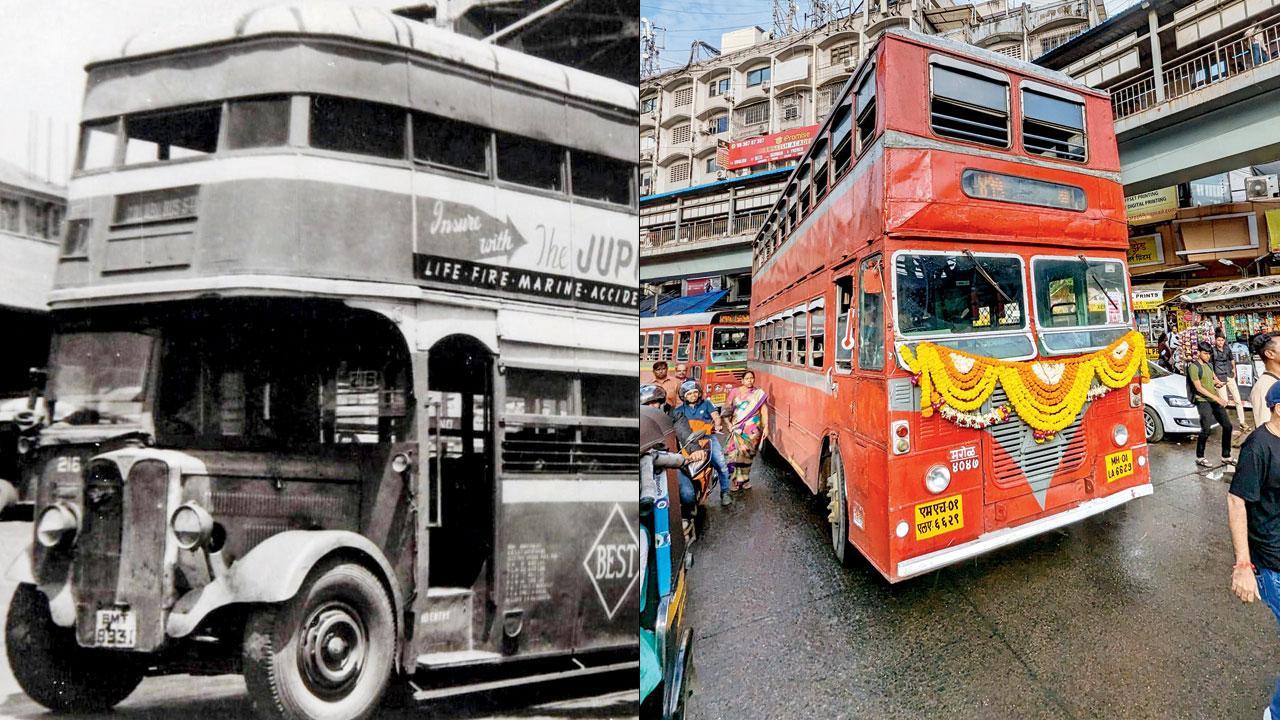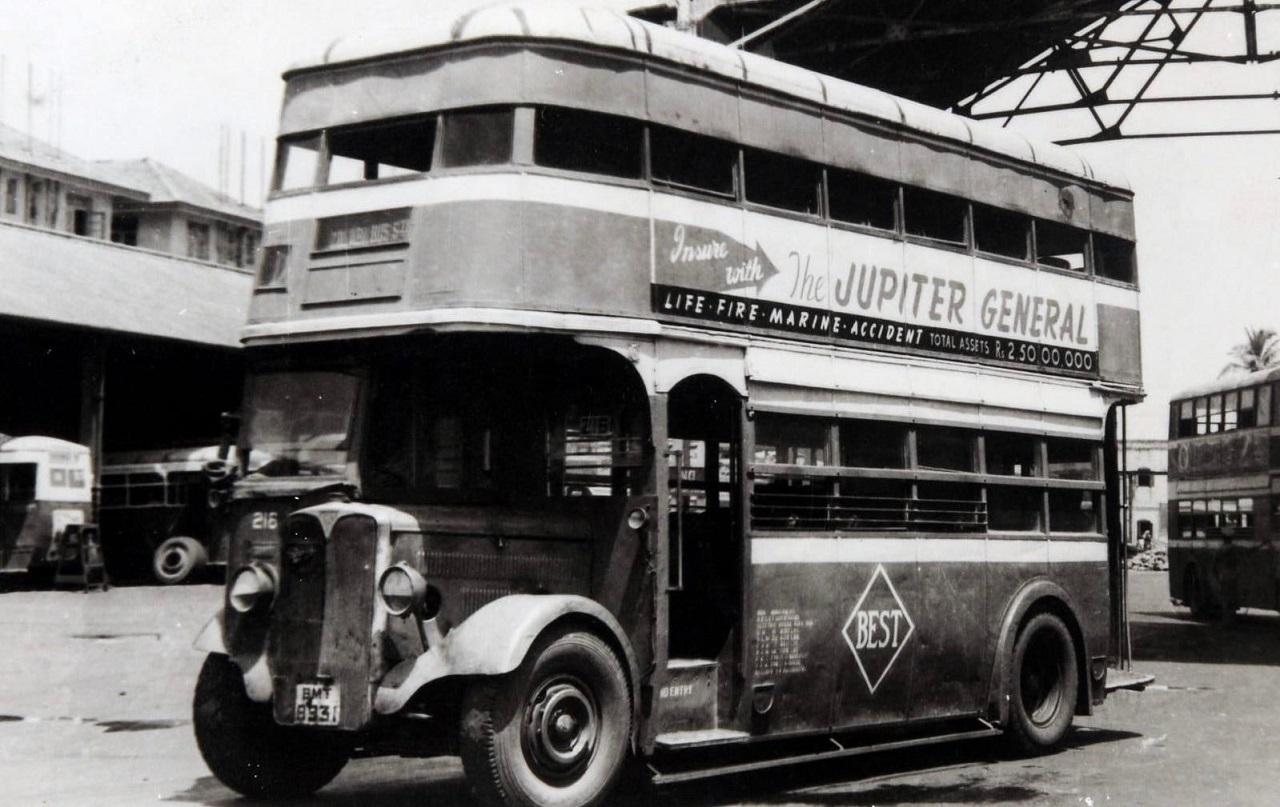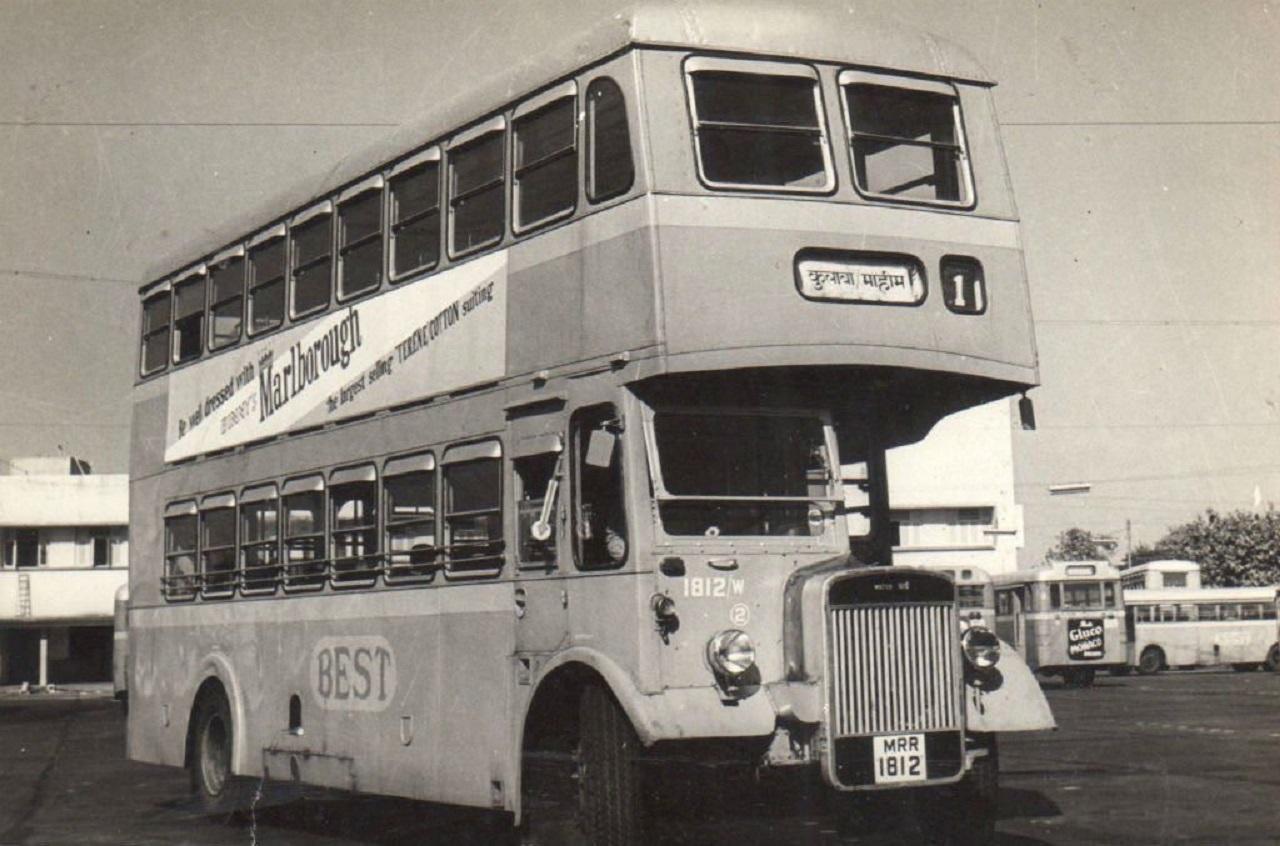The BEST’s double decker bus, which has been synonymous with the city for over eight decades, made its final ride on Friday evening

One of the first double decker buses of Mumbai. Pic Courtesy/Mumbai Heritage, (right) The old double decker bus on its last rides through the streets of the city on Friday evening
Key Highlights
- BEST archives state that buses were introduced in 1937 on lines of those running in London
- Like S Arun, for instance, who took nearly 20 rides in the last two days alone
- The roar of the diesel engine felt like a lion advancing as other vehicles made way for it
The old sloping bonnet, the bhopu bulb horn, the twirling staircase and the mechanical cord bell - the old and iconic roaring diesel-powered double decker buses with such unique features that had been the mainstay on Mumbai’s roads bowed out gracefully after 86 years of journey on Friday evening amid much fanfare, rue and nostalgia.
ADVERTISEMENT
“The buses had class and value, and entire generations were its fan club. However, changing times and the need for more modern and efficient transportation options have led to the retirement of these beloved vehicles. Their departure marks the closing chapter of a cherished era, leaving behind a treasure trove of memories. Sitting in a double-decker bus always evoked some of the best memories. The most cherished moments include the thrill of climbing up the narrow spiral staircase to the upper deck, where you'd grab a front-row seat by the large, panoramic window. From that vantage point, the world seemed different, more expansive, and full of possibilities. Watching the cityscape unfold as the bus rolled along, with the wind tousling your hair and the gentle rumble of the engine beneath you, was a unforgettable experience,” said Kunal Tripathi, who runs the popular mumbaiheritage account on social media.

Pic Courtesy/Mumbai Heritage
“Going by the old double decker bus was a normal part of life. ...took it for granted that it will stay for eternity. I am happy to have enjoyed it till the very last, that too, with like minded Mumbaikars. It is now time for the next generation to create its own nostalgia. Our generation will have this one experience to cherish and a story to tell,” said Mumbaikar S Arun, who took nearly 20 rides on the last two days of the bus.
“I remember travelling to school in them and they were the king on the road. The diesel roar made it feel like a lion among other vehicles. The new electric double deckers are silent, glass-made babies and yet to prove themselves on Mumbai’s roads,” said bus fan Shubham Padave who made it a point on Friday to make announcements during every trip to commuters that it was the last day of the icon.
The iconic red double decker buses have been a part of the cityscape since more than eight decades and have also been a Bollywood favourite. They featured in that popular song from the 1980s film Shaan where Shashi Kapoor and Amitabh Bachchan try to woo their ladies by literally hijacking a double-decker bus and the one in Amar Akbar Anthony, where Lalita Pawar calling out for Pran, falls off the bus platform.
BEST archives state that the buses were introduced in 1937 on the lines of those running in London. The Daimler Motors double decker buses were the first generation of double decker buses to be introduced in the city.

Pic Courtesy/Mumbai Heritage
“The features of old Routemaster buses of sloping bonnet, open deck platform and the rear, the curvy staircase made it to Mumbai along with the original design, which had been recently changed a few decades ago. Many of the Ashok Leyland red double-deckers used by BEST have been close clones of the Routemaster. The BEST also used to run articulated buses where the driver’s cabin was separate from the passengers’ chamber. These buses ran for a few decades and had more seating capacity than the traditional double decker buses. But they proved to be difficult while negotiating curves on narrow Mumbai roads,” the archives state.
The BEST Museum at Anik has brought the remains of the first class of double decker bus back to life. A 1938-built chassis of a Daimler double decker BEST bus that has been lifted up three floors and placed in the centre of the museum has been dismantled part by part and assembled again. The BEST staff at the museum have put in place signage of how this first bus used to operate, labelling all its parts and spares. A small ladder has been placed at the old driver’s cabin and one can even take a selfie there. Officials explained that though this was the last remaining chassis of a 1950s bus, exactly the same design as that of the 1937 bus because it came from the same lot.
“There were 308 such double decker buses and 77 single deck ones between 1953-1955. The last bus of the series was bought in 1952-53 and it remained in public service until 21 December 1972. On the last day, there was a public ceremony attended by the then Mumbai Mayor Khajibhai Ganatra and at the wheel was BEST General Manager PB Kerkar who drove it into Mumbai Central bus depot,” a museum note said.
On Friday, as the old bus reached Andheri station and waited for passengers to alight near a tightrope walker girl who had set up on the street and performing her balancing act, just like the BEST officials said they would balance out the exit of old double decker buses with new electric and all AC ones.
“The double deckers are here to stay. Just that the old version is getting replaced with the AC one, which is safer, environment friendly. We have tried to incorporate some features of the old bus into it. 900 are expected to arrive in the next nine months,” a BEST spokesperson said.
“But sadly, we will sadly lose the fun of the first seat on the top floor and watching the world with the breeze hitting our faces. We have appealed to the Chief Minister and everyone to preserve a few ones,” said Rupesh Shelatkar, president of commuter rights’ body, Aapli BEST Aaplyasathi.
 Subscribe today by clicking the link and stay updated with the latest news!" Click here!
Subscribe today by clicking the link and stay updated with the latest news!" Click here!







